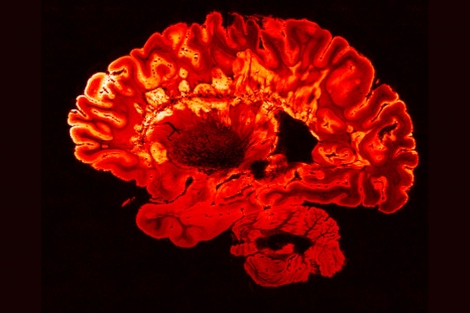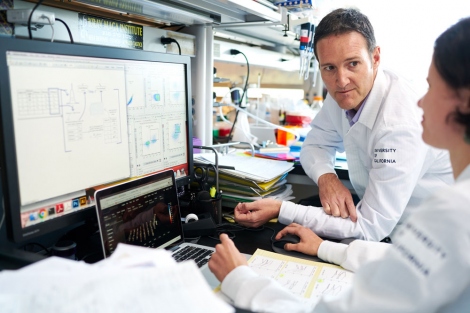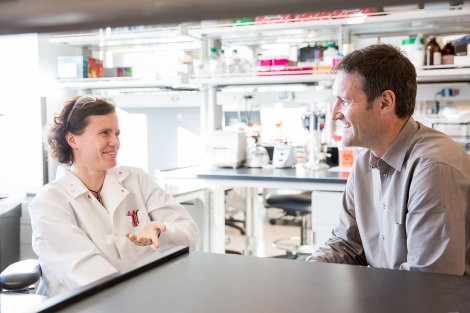Gut Microbes May Influence Multiple Sclerosis Progression

Researchers at UC San Francisco have identified specific gut microbes associated with multiple sclerosis (MS) in human patients, and show that these microbes take part in regulating immune responses in mouse models of the disease.
The new findings – to be published during the week of Sept. 11, 2017, in the Online Early Edition of Proceedings of the National Academy of Sciences (PNAS) – suggest that gut microbes may play a role in the neurodegeneration that characterizes MS. The authors hope the finding will help scientists understand the origins of MS and potentially lead to treatments, such as dietary changes or drugs based on microbial byproducts, that could improve the course of the disease.
MS is an autoimmune neurodegenerative disorder that affects approximately 2.5 million people worldwide with progressive loss of vision, weakness and tremors, and problems with coordination and balance. It is caused when the immune system attacks the layers of insulation that surround nerve cells. Researchers have learned a great deal about MS over the past decades, but continue to puzzle over why the immune system turns against the nervous system’s insulation, known as myelin, in the first place.
“The field has been very successful in identifying genes associated with susceptibility to MS, but I’ve never been satisfied with amount of risk that we’ll be able to explain with just genetics,” said Sergio Baranzini, PhD, a professor of neurology and a member of the UCSF Weill Institute for Neurosciences and the senior author on the new study. “Even identical twins, who share the same genetic inheritance, only share an MS diagnosis about 35 percent of the time. It’s clear the genome is important, but environmental factors must also play a major role.”
Many suspected environmental contributors to MS, such as history of smoking, diet, and environmental exposures, are very hard to pin down and associate with a biological impact on patients, Baranzini said.
But a growing number of studies demonstrating that gut microbes can directly influence the function of the human immune system suggested a new possibility to Baranzini: Since “the intestine is actually the most intimate connection between the outside world and the immune system,” he explained, the human gut microbiome could play a role in the onset or progression of MS.
Mining for Microbes
When Egle Cekanaviciute, PhD, arrived in the Baranzini lab as a postdoctoral researcher in 2014, she was eager to take on the challenge of studying whether features of the gut microbiome might influence the immune system’s predisposition to trigger MS.
“This was such a novel question, especially at that time,” Cekanaviciute said. “No one had looked at the microbiome in MS – almost no one had looked at the role of gut microbes beyond digestive diseases.”
In the new study, Cekanaviciute and collaborators analyzed the gut microbiome composition of 71 MS patients as well as 71 healthy control subjects, and identified specific species of bacteria that were either more or less common in people with multiple sclerosis than the general population. Then they turned to the much more difficult task of investigating how these differences in gut bacteria might influence the immune system’s attack on myelin in MS.

“A lot of microbiome studies say, ‘These bacteria are increased in patients with a disease, and those bacteria are reduced.’ And then they stop,” Cekanaviciute said. “We wanted to know more: should we care about the ones that are increased because they are harmful or the ones that are decreased because perhaps they are helpful? What do these microbes actually do that could have an impact on people’s health?”
At the time, there were no standard techniques for answering these questions, so Cekanaviciute developed an array of new approaches for testing the functional role of the bacterial species they had identified as altered in patients with MS.
First, the team explored whether components of these bacteria could alter the behavior of human immune cells to make them either pro- or anti-inflammatory. They exposed human immune cells in laboratory dishes to blended extracts of each bacterial species, and found that two species of bacteria that were more common in people with MS – Akkermansia muciniphila and Acinetobacter calcoaceticus – triggered the cells to become pro-inflammatory, while a species of bacteria found at lower than usual levels in MS patients – Parabacteroides distasonis – triggered immune-regulatory responses.
To see how these bacteria might affect the immune system as a whole, the researchers then introduced each of these three species of bacteria into mice who otherwise lacked a microbiome (to simulate overgrowth of these strains relative to other strains of bacteria) and found that they had a similar effect: A. muciniphila and A. calcoaceticus triggered inflammatory immune responses, while P. distasonis tamped down inflammation.
But these experiments only examined the impact of one bacterial species at a time – the question remained how the complex microbial ecosystems of MS patients might impact neurodegeneration. To answer this question, the team performed fecal transplants on mice with an experimentally induced form of MS. The researchers found that replacing the microbiomes of these mice with the microbiomes of patients with MS caused the animals to lose key immune-regulatory cells and to develop more serious neurodegeneration, suggesting that the microbiome alone could contribute to the progression of MS.
A second study published in the same issue of PNAS – led by researchers at the Max Planck Institute in Germany and co-authored by Cekanaviciute and Baranzini – also found that microbiome transplants from MS patients could exacerbate symptoms in mice with a genetic model of the disease.
“Two different groups, using two separate cohorts of patients and controls, and two distinct mouse models of the disease, saw very similar results,” Cekanavicuite said. “This is very promising evidence that we’re on the right track.”
Microbe-based therapies for MS?
Together, these findings suggest that the microbiome may play a key role – alongside genetic predisposition and other environmental factors – in the origins of MS. In particular, the authors propose that particular gut microbes may trigger heightened levels of inflammation that contribute to or exacerbate the immune system’s attack on myelin in MS patients.
“To be clear, we don’t think the microbiome is the only trigger of MS,” Cekanaviciute said. “But it looks like these microbes could be making the disease progression worse or better – pushing someone with genetic predisposition across the threshold into disease or keeping them safe.”

The authors hope that future research will shine light on exactly how these bacterial populations influence the development and progression of MS. For instance, the authors note that at least one of the bacterial species found in patients with MS produces molecules that mimic proteins found in myelin, suggesting that the presence of these bacteria could confuse the immune system into attacking myelin as well as the bacteria.
The authors also note that P. distasonis, the bacterial species found at lower-than-normal levels in MS patients, is thought to help the immune system learn to control its response to non-threatening gut microbes. Lacking these bacteria may allow the immune system to overreact to harmless microbes in people with MS, leading to destructive inflammation.
Baranzini says he hopes the field will be able to use these findings to develop novel therapies for patients with MS: “The microbiome is very malleable. You could relatively easily change it in an adult who has MS or is susceptible – something you cannot do with their genetics. This is not a magical approach, but it is hopeful.”
Like many autoimmune diseases, Baranzini says, the prevalence of MS has increased significantly over the past century, which many researchers attribute to modern changes in lifestyle, including diet, sanitation, and exposure to natural environmental microbes, all of which could impact the human microbiome.
“All of these factors have certainly altered the human microbiome, perhaps in a way that has led to more autoimmune disease,” Baranzini said. “Studies like this suggest there might be a way of trying to modulate our microbiota to restore the lower-risk, less inflammatory metabolism that was characteristic of humans 100 years ago.”
The research was funded by the National Multiple Sclerosis Society, the National Institutes of Health IRACDA postdoctoral fellowship, the US Department of Defense, the Valhalla Charitable foundation, the Emerald Foundation, and the Heritage Medical Research Institute.
Additional authors on the paper were Sneha Singh, Charlotte Nelson, Rachel Kanner, Stephen Hauser, MD, Elizabeth Crabtree-Hartman MD, and Bruce Cree, MD, all of UCSF; Bryan Yoo, Yun Kyung Lee, PhD, and Sarkis Mazmanian PhD, of the California Institute of Technology; Tessel Runia, MD, of Erasmus University Rotterdam; Justine Debelius, PhD, and Rob Knight, PhD, of UC San Diego; and Yadira Bencosme, Ilana Katz Sand, MD, Patrizia Casaccia, MD, PhD, Mar Gacias, PhD, and Yungjiao Zhu, PhD, of Mount Sinai Medical Center in New York.
UC San Francisco (UCSF) is a leading university dedicated to promoting health worldwide through advanced biomedical research, graduate-level education in the life sciences and health professions, and excellence in patient care. It includes top-ranked graduate schools of dentistry, medicine, nursing and pharmacy; a graduate division with nationally renowned programs in basic, biomedical, translational and population sciences; and a preeminent biomedical research enterprise. It also includes UCSF Health, which comprises three top-ranked hospitals, UCSF Medical Center and UCSF Benioff Children’s Hospitals in San Francisco and Oakland, and other partner and affiliated hospitals and healthcare providers throughout the Bay Area.